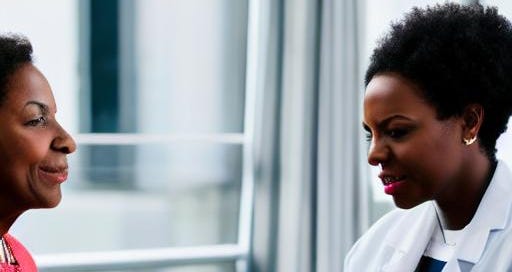I'm not a doctor and I don't play one on TV. BUT....
Let's chat about women not being taken seriously on health concerns.
I’ve been sitting on this post for a bit because it’s a serious topic that is very close to my heart.
The topic is being a woman and not taken seriously when you have a health concern.
If you stop reading now because you’re busy, no problem. Just read the next sentence.
I want you to advocate for yourself when you don’t feel right. If you’re not feeling as though you are being listened to, find a medical provider who WILL listen to you.
[Reading time from this point: 4 minutes, 25 seconds]
Background
In May, US Olympic gold medalist, Tori Bowie, passed away from complications related to childbirth. She was a Black woman. I am mentioning her race because Black women have a maternal mortality rate that is 2.6x higher than white women.
It’s been upsetting me as it’s something that is preventable, yet continues to happen. It is part of a larger trend around women’s healthcare and being taken seriously when we have medical concerns.
Sit on that for a minute:
The US is the wealthiest nation in the world and we have some of the worst maternal mortality rates in the world, particularly for Black women.
According to the autopsy, Bowie had possible complications which included respiratory distress and eclampsia. She had seizures brought on by preeclampsia, a high blood pressure disorder that can occur during pregnancy.
Let me name two other very high profile women who also happen to be Black and had similar complications, but survived:
Serena Williams, winner of 23 Grand Slams in tennis
Allyson Felix, most decorated US track and field athlete all time
These are women who have access to the best care. Yet all developed this life threatening condition which is very prevalent amongst Black women. Medical experts consider many of these deaths to be preventable.
I have a pretty good sense of my body. This is because of understanding my autoimmune diseases and the training I do. But when you’re a professional athlete, that’s a whole other level. These women know every aspect of their bodies. Williams gets into horrific specifics in ELLE magazine.
“Being heard and appropriately treated was the difference between life or death for me; I know those statistics would be different if the medical establishment listened to every Black woman’s experience.” - Serena Williams, ELLE magazine
Think about all the Black women who are not being heard, particularly in underserved communities. Felix described a family dinner in TIME magazine when she was pregnant. They were discussing the various symptoms they had during their respective pregnancies. None of them were aware that their symptoms were all potential signs of something life threatening. A week later, Felix was fighting for her life.
"When I became pregnant, my doctor didn’t sit me down and tell me, ‘these are things that you should look for in your pregnancy, because you are at a greater risk to experience these complications.’ - Allyson Felix, TIME magazine
Get educated…. if only to understand the questions to ask
That means we need to do homework ourselves when we meet with medical professionals. And we need to verbalize what we have learned and/or have questions about.
Let me clear. I’m not anti-doctor. I’m very pro-doctor. But I also do my homework before going into any medical appointment. That said, I am lucky that I have a fantastic primary care doctor and have access to excellent care.
The reality is that women tend not to believed when they bring up health concerns. We are underrepresented in clinical trials and it gets worse when you break out race, ethnicity and sexual orientation. Let’s not even get into the body image stigma that is definitely out there.
I’m going to get into more of this, particularly in other areas of women’s health and the associated stigmas:
Menstrual cycles and associated symptoms
Perimenopause and post-menopause, which have a massive amount of symptoms
Heart health and associated symptoms
I talked in the past about how I was able to make long lasting changes to my health but much of that had to do with my personality. If you know me, you’re laughing right now. But the reality is that if you don’t advocate for yourself and do your own homework on options presented to you, you could be putting your health at risk.
I’ll leave with you with this fact:
A study showed that middle-aged women with chest pain and other symptoms of heart disease were twice as likely to be diagnosed with a mental illness compared with men who had the same symptoms. Think about that!
What’s the alternative?
Again, advocate forcefully and vigorously for yourself. If people think you’re being bitchy, pushy, aggressive, bossy or whatever other adjective that others like to use to describe women who fight for themselves, who cares?
Let me be clear. I am not a doctor and I don’t play one on TV. But I do know what it is like to have to get medical professionals to take a harder look at health symptoms I have experienced over the years. One of those situations landed me in the ER with a case of diverticulitis, which was more painful than my hip replacement. I’m not kidding.
It took awhile but I finally found a set of doctors who listen to me when I have medical concerns.
Ironically I am in better health now because of my self-advocacy.
If you need help figuring out the best way to advocate for yourself, get in touch. I can help. I have walked that walk.





If you haven't listened to the Retrievals yet, run don't walk. Podcast about women in a Yale Fertility clinic who were given saline instead of fentanyl. You can imagine how they were listened to.